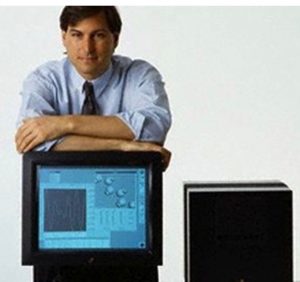History (1988): What to Think of Steve Job’s Job at Next Company?
Concerning new computer with just magneto-optical unit for storage, without HDD or FDD
By Jean Jacques Maleval | June 5, 2019 at 2:15 pmIs the announcement of October 12, 9988, by Next Inc. (later NeXT Computer, Inc. and NeXT Software, Inc.), and Steven P. Jobs, one of Apple Computer’s founder and one of the biggest names in the computer market these last years, going to be an important event in the next ten years for microcomputers, just like when the Apple company began?

It’s a bit too early for such a forecast. We will simply focus on one angle of the device that impressed the public but seems to us like one of its weaknesses: the magneto-optical disk, the first one announced by a large manufacturer (besides Sony that is proposing one in Japan and in the US), and the Discus Rewriteable from Advanced Graphics Applications, New York, NY, that is announcing for this November what is only an optical subsystem based on an Olympus drive and a 3M disk for $4,995).
What is peculiar about the Next Computer System is that it is offered without the standard Winchester magnetic disk, and even without a diskette and of course without a cassette or cartridge backup system. It includes one single external storage unit, a magneto-optical disk recorder, a peripheral originated from Canon Inc. (Japan) including a reversible 256MB media, meaning high capacity and interchangeability, unlike Winchester disk. It’s controlled by
a special chip named Optical Storage Processor (OSP). Average access time is 93ms on Canon’s specifications, but according to Next, this time drops to 60 or 70ms with the new OSP.
Of course, those who work on microcomputers can easily imagine how great a high-capacity interchangeable on demand device would be, especially when it only costs $50.
But when you look at it closer, it’s not quite as exciting. First of all, the system does not include a floppy disk drive and it’s hard to figure out how a user will be able to load programs in his machine. It would be surprising if software publishers offered their products for sale on this special 5.25-inch magneto-optical disk just to make Steve Jobs happy.
This problem should soon be resolved since a 1.44MB unit station is expected. It seems that Jobs,wanted to make his presentation even more stunning as he started announcing a computer with just this magneto-optical unit and by taking the diskette out to make it even more obvious.
But this isn’t all. The Next computer is planned to advance as far as possible in multimedia processing, by connecting numeric and alphabetic data, texts, sounds and images with a large internal processing capacity. This can be achieved with a large external memory – 256MB, it’s not so bad -, but also fast access time. 60ms is a little too much compared to Winchester’s 12 to 20ms, used by most workstation developers.
On today’s market, you can find 5.25-inch, 38MB (and soon 760MB) HDDs much quicker.
Did Jobs realize his mistake since a few days after his announcement we find out that an agreement was being signed between his company and Maxtor Corporation (San Jose, CA), one of the main leaders for high-ranged Winchester disks, precisely to become Next’s exclusive supplier of … HDDS (in 360 and 760MB)?
So all the noise made about magneto-optical disks seems to end up in smoke. No one actually knows the price of Next’s magneto-optical disk drive, neither the price of a second one that would allow backing up (according to some sources the price would be about $1,495, cheaper than Sony’s model with twice less capacity.)
For a long time, rumors ran that Canon was not getting involved with WORM optical disks to directly work on magneto-optical ones. And here is the proof, even if you hear more about the developments of Sony, Olympus/3M, Kodak or Maxtor (with PDO or Seiko/Epson) rather than Canon.
This latter one would have supplied its disk to Next in the beginning of the year and the Japanese company would have not appreciated the delay Steve Jobs took to announce his system. In today’s,magneto-optical technology, we will stay aware and check out if Canon will supply Next in time.
A last detail: Canon’s disk is not an exceptional product in the magneto-optical market. Other manufacturers are aiming 325MB per side, rather than 256MB on single side. And speaking about access time, it is about the same as other competitors except for Maxtor’s unit, even if its is questionable.
This article is an abstract of news published on the former paper version of Computer Data Storage Newsletter on issue ≠9, volume ≠1, published on October 1988.
Note from editor: Apple purchased never successful NeXT in 1997 for $429 million. As part of the agreement, Steve Jobs, chairman and CEO of NeXT Software, returned to Apple. He promised to merge its software from NeXT with Apple’s hardware platforms.













 Subscribe to our free daily newsletter
Subscribe to our free daily newsletter

